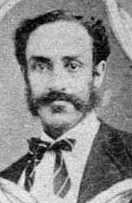George Thompson Ruby was born in New York in 1841 but reared in Portland, Maine. After acquiring a sound liberal arts education there, he journeyed to Haiti, where he worked as a correspondent for the Pine and Palm, a New England newspaper edited by abolitionist James Redpath. Ruby sent information about Haiti to African Americans in the United States. Ruby settled in 1864 in Louisiana, where he was employed as a schoolteacher. He left Louisiana two years later after being beaten by a white mob while trying to establish a school for black children at Jacksboro.
In 1866 George Ruby joined the Freedmen’s Bureau at Galveston and began administering the agency’s schools while simultaneously serving as a correspondent for the New Orleans Tribune. He briefly published the Galveston Standard. Between 1866 and 1867 Ruby was a traveling agent for the Bureau, visiting Washington, Austin, Bastrop, Fort Bend, and other counties to establish chapters of the Union League and temperance societies.
In 1869 Ruby was appointed deputy collector of customs at Galveston, an important political patronage position. During his tenure he was on friendly terms with Texas Governor Edmund J. Davis and with such prominent white Galvestonians as Victor McMahan of the McMahan Banking House and District Judge Chauncey B. Sabin. After relinquishing his position with the Freedmen’s Bureau, Ruby became president of the Union League in 1868 and through this office rose within the ranks of the Texas Republican Party.
In 1869 Ruby was elected to the state Senate from the predominately white Twelfth District. As a senator Ruby introduced successful bills to incorporate railroads, banks and insurance companies and to provide for the geological and agricultural survey of the state. Ruby cemented his political power by organizing black Galveston longshoremen into the Labor Union of Colored Men.
George Ruby chose not to seek reelection in 1873 because the Democrats regained political power in Texas. He returned to Louisiana and became clerk of the surveyor for the Port of New Orleans. From 1877 to 1882 Ruby edited the New Orleans Observer. Unlike most Southern black editors and politicians he supported the Exoduster movement of 20,000 Louisiana and Mississippi blacks to Kansas in 1879-1880. Ruby died of malaria in New Orleans on October 31, 1882.

